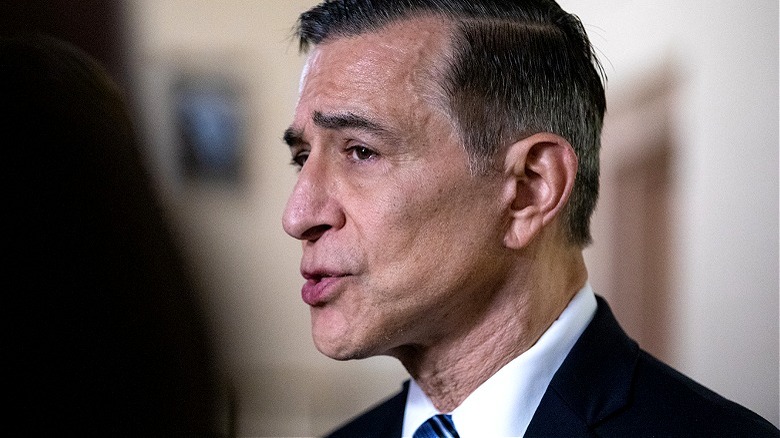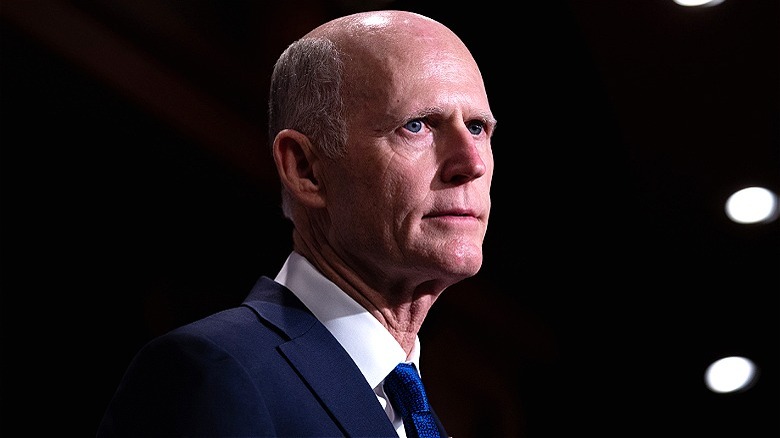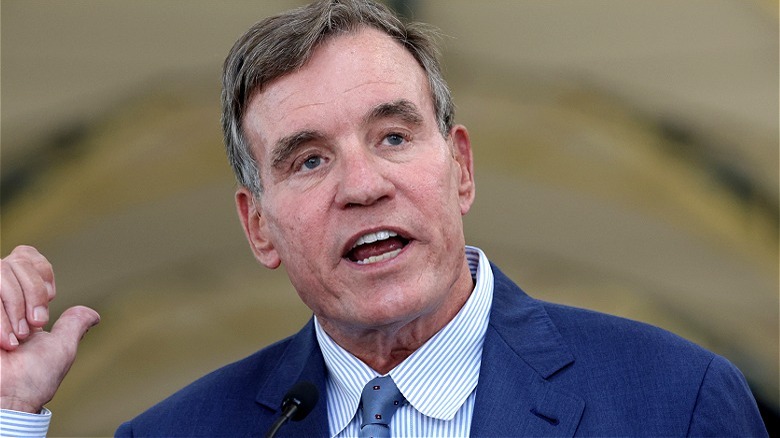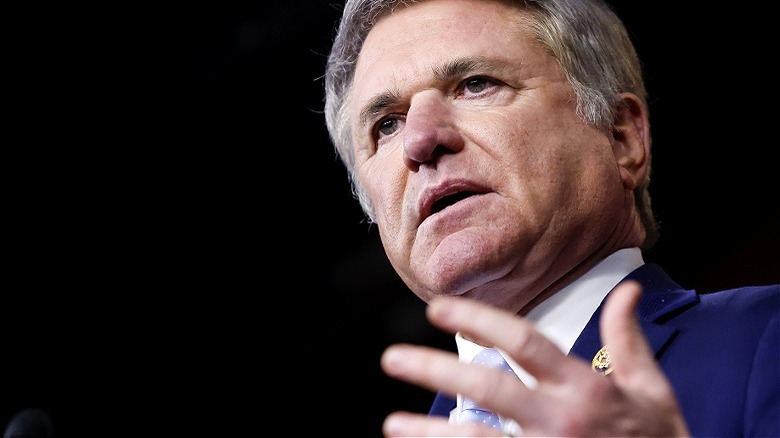Who Are The Richest Members Of Congress?
When the Constitution was established, and the congressional branch first created, the framers never imagined the idea of a person being a career politician. In fact, being selected to serve as a member of Congress, while seen as an honor, was incredibly difficult. Unlike in modern times, congressional members in the late 1700s/early 1800s only served their position in a part-time capacity, generally for just a few months out of the year. They had jobs, livelihoods, and families in their home states, which they had to leave behind in order to live temporarily in either New York City or Philadelphia (where Congress met between 1785 and 1800). These cities were not only expensive but congressmen were paid just $6 a day.
While many of the nation's early congressional members viewed their personal sacrifices as being necessary for the public good, today's Congress is a different story. Not only do most members have homes in the District of Columbia (where their families join them for their term in office), but these politicians are also paid exceptionally more than the average American (earning $174,000 annually). This is despite the fact that members of the House of Representatives work, on average, just 146.7 "legislative days" while senators work 165 days. In comparison, the average American works about 240 days a year.
Yet, despite the high federal pay (not to mention pensions and benefits), there are still members of Congress who are substantially richer than others. Through private investments, family money, and even business deals, these are the richest members of Congress today.
Rep. Darrell Issa
With net worth estimates ranging from $283 million to $768 million, it's difficult to pin down the exact dollar amount attached to Rep. Darrell Issa. However, regardless of which specific figure you look at, he's easily one of the, if not the, most wealthy members of Congress.
A Republican who currently represents California's 48th Congressional District, Issa previously served as the congressional representative for California's 48th District from 2001 to 2003, the 49th District from 2003 to 2019, and the state's 50th District from 2021 to 2023. Despite being formally nominated by former President Trump to head the U.S. Trade and Development Agency in 2018, delays in Issa's confirmation hearings (fueled by vetting issues and a questionable FBI background file) ultimately killed his candidacy. Issa then ran for and won a new seat in Congress in the 50th District before returning to his current district, assuming that office in 2023.
Issa has consistently been one of the richest members of Congress since taking office in 2001, and this has a lot to do with his work as the founder, and former CEO, of Directed Electronics. A vehicle security products company, Issa's introduction of the Viper and Python car alarm systems propelled the company's success. Issa sold the company in 1999, just before being elected to Congress for the first time. According to his financial disclosures, the majority of Issa's wealth is currently held in stock funds as well as in his properties in both California and Ohio.
Sen. Rick Scott
This Republican congressional member previously served two terms as Florida's governor. Rick Scott's over $300 million net worth is largely due to co-founding two different profit-driven health care companies: Columbia Hospital Corporation (now known as HCA Healthcare) and Solantic. Columbia Hospital Corporation, in particular, became the world's largest health care provider after several hospital acquisitions. However, federal investigations found the company had committed Medicare fraud, and had to pay $1.7 billion in fines as a result. Scott was forced to resign as CEO from the company shortly after, but not without taking $300 million worth of stock, a $5 million severance lump sum, and a five-year $5 million consulting contract with him when he left.
Rick Scott co-founded another health care project, Solantic, in 1991. While he technically left the company's board just before announcing his candidacy for governor in 2010, Scott did not get rid of his interest in the company, instead choosing to place his stocks in his wife's name. Many believed this created a conflict of interest for him, particularly when it came to health care policy decisions as governor. One Scott-introduced proposal in particular, that called for mandatory drug testing for state employees and benefits recipients, was seen as a way for Solantic to financially benefit. He finally sold his controlling interest shares in the company in 2011, claiming to have sold them for less than their prosed value of $62 million, but neither side disclosed the specifics. Scott's current net worth is tied to his extensive holdings including stocks, bonds, LLCs, private equity funds, gold trusts, and even treasury notes.
Sen. Mark Warner
The only Democrat on this list, Sen. Mark Warner had a long business career before becoming the governor of Virginia from 2002 to 2006. After serving as governor, Warner then successfully ran for the U.S. Senate in 2008 and has been serving Virginia in this capacity ever since. His current term finishes in 2027, and his net worth is estimated to be at around $215 million.
Warner's career involved being an active investor, mainly in the telecommunications industry. He was involved in providing capital for hundreds of tech startups through the venture capital firm he founded, Columbia Capital. This enabled his company to acquire early investments in companies that would go on to be extremely financially lucrative. This includes being early investors, founders, and cofounders in such companies as XM Satellite Radio and Capital Cellular Corporation, which later became Nextel Communications. With that in mind, a significant portion of Warner's early wealth was the result of a 1986 government lottery that gave the rights to certain companies to build some of the country's very first cellphone networks. By convincing the lottery winners to allow him to sell their rights (for a cut), Warner was able to legally profit off what was intended to be a government subsidy for the betterment of citizens.
Per a 2022 report from Mother Jones, Warner still reports $30.8 million in investments in private equity. The rest of his wealth is divided up among mutual and hedge funds.
Rep. Michael McCaul
A Republican member of the House of Representatives from Texas' 10th Congressional District, Michael McCaul has served in Congress since 2005. Similar to Sen. Mitt Romney, Rep. McCaul's estimated net worth (which ranges from $200 million to $294 million) isn't entirely his own doing. In fact, most of his wealth is actually due to his wife's inheritance. Linda McCaul's father, Lowry Mays, founded Clear Channel Communications, better known today as iHeartCommunications. The Mays family sold their stake in the company in 2006 (and in another Romney connection, it was sold in part to Bain Capital) for $17.9 billion.
In 2011, McCaul rather suddenly burst to the top of the congressional pay radar due to key wealth transfers from his in-laws. In addition to generational wealth from Linda McCaul's side, the McCaul household also reports having millions of dollars of investments in LLCs, plus substantial iShares funds. Notably, the McCauls reported a minimum of $250,000 worth of Netflix stock.
Rep. Vern Buchanan
Vern Buchanan is a Republican member of the U.S. House of Representatives from Florida, serving since 2007 and representing the 16th Congressional District since 2013. His net worth hovers around $249 million, making him one of the richest members of the House and among the richest in Congress overall. Buchanan's fortune is largely self-made, stemming from his extensive business career prior to entering politics. He built a substantial automotive empire — at one point he owned nearly 20 car dealerships across the state.
These days, Buchanan's wealth is diversified. He has extensive real estate holdings along with various businesses he either runs or owns a stake in, along with other investments. His business acumen and financial independence have contributed to his influential role in Congress, where he serves on the powerful House Ways and Means Committee. Given his outsize wealth, it's no surprise he heavily favors tax cuts on the wealthy.





